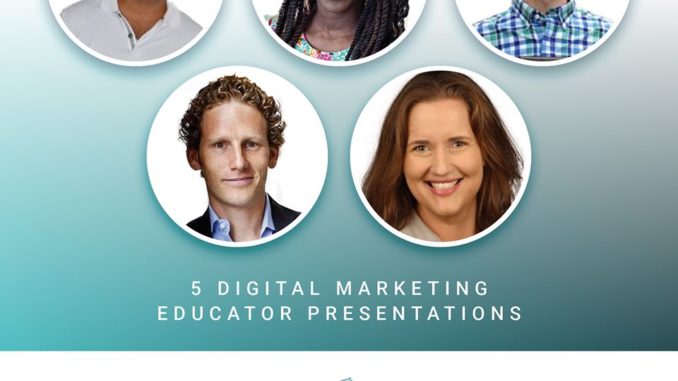
This post may contain affiliate links. Please read my disclosure for details.
I had a great opportunity on August 16 to speak as part of the summer 2019 Stukent Digital Marketing Summit. If you missed it, I want to share one key takeaways I got form each speaker (In reality, there were too many takeaways to keep track of).
Jonah Berger
Jonah Berger (@j1berger) is a professor in the Wharton School of Business and the author of several influential studies on online word of mouth. He is famously the author of the book .
Jonah discussed research on why people share ideas, whether through word of mouth offline or online. He noted that understanding psychology is at the center of how ideas spread. For example, people want to be insiders and they want status. The status is only valuable, though, if others know about it. What good is it to be a frequent flyer if you can’t brag a little? (This resonates with me. When I FINALLY got frequent flyer status on United, I rocked the Silver tag on my bag so everyone could see I ‘had arrived’).
Jonah also discussed turning customers into advocates for your brand. He further explained how a brand or product can be embedded within an idea in such a way as to help it spread, like the famous panda cheese commercials. The panda is odd and funny, and his actions carry the product. So the panda is a key part of Panda Cheese.
Key Takeaway: The WHY of what we share is critical to understanding how ideas spread.
Audio is the future (and the future of student feedback).
Leo Morejon (@MoreLeo) is an award-winning marketer and educator as well as a professor teaching at West Virginia University. He is the host of a great podcast, the Build & Inspire podcast.
Leo discussed how he uses audio and his experience and skills podcasting to provide rich audio feedback to his students. Benefits include the ability to share emphasis and emotion in feedback (which can be lost or misinterpreted in text), greater class engagement for online classes, and time-saving in grading for professors. I’m always inspired by Leo’s passion and energy and I can see how written student feedback just can’t capture that.
As Leo said, EDU is too text heavy. When we compare to the popularity of audio in our everyday lives, it makes sense. My commute is all about podcasts (Right now, I’m binging on the cold case true crime podcast, Someone Knows Something: Season 5). I was also blown away by this stat about the rise of voice-enabled digital assistants among the student-aged population.
Takeaway: I need to try audio feedback this semester! I hope you’ll try it too.
Many Students Aren’t Prepared
Mary Owusu (@AnalyticsMary) is the Senior Vice President of Digital Strategy & Analytics at Mower. She also teaches undergraduate and MBA-level classes at Canisius College.
Mary discussed issues surrounding student preparation for careers in digital marketing. She noted that according to the AACSB, 1 in 3 programs do not offer a single digital marketing course. But we professors can prepare our students. For example, she shared a great list of many certifications that professors can use to help prepare students. She also discussed the need to push our students to succeed and to also push for diverse perspectives in the classroom.
Great takeaways from @analyticsmary is to ban homogenous thinking, students must demonstrate how to optimize & analyze performance for digital marketing #StukentDS19 pic.twitter.com/PYO6f7cLFh
— Willis Turner CAE 
Takeaway: Hold students to high standards and ban homogeneous thinking.
Now, more than ever, it is an exciting time to be a professor and influencer in the education space.
Karen Freberg (@kfreberg) is an associate professor of strategic communication at the University of Louisville. She’s the author of the popular social media textbook and accompanying workbook, , and an awesome book for professors about how to teach a social media class, .
Karen spoke about how professors can be influencers and why we should be. She provided lots of great tips on ho we can do this, including formulating strategic partnerships with organizations. Karen has done a truly impressive job doing this, including her participation helping build the forthcoming Facebook Blueprint (search Facebook Blueprint in the Social Media Professors Facebook group to learn more) and her role in creating the Cannes Lions Educator Summit. She also reminded us that the best way to build our own brands is by lifting up others and creating community, stating ‘Show your influence by bringing people together.’
Being an educator looks a lot different than it did a few years ago. Learn what you need to be doing as a modern educator from @kfreberg.
— Stukent (@StukentApp) August 16, 2019
Key Takeaway: What it means to be a professor today is changing. Universities can recognize this, moving beyond evaluating professors just on teaching, research, and service.
If you registered for the event (whether you were able to attend or not), Stukent will be sending out a recap with edited video, handouts, and more.
Thank you so much to everyone who participated in the event. I really enjoyed speaking and sharing about using Facebook Audience Insights in the classroom with everyone.
I hope everyone enjoyed the event and is getting ready for the start of a new semester!
